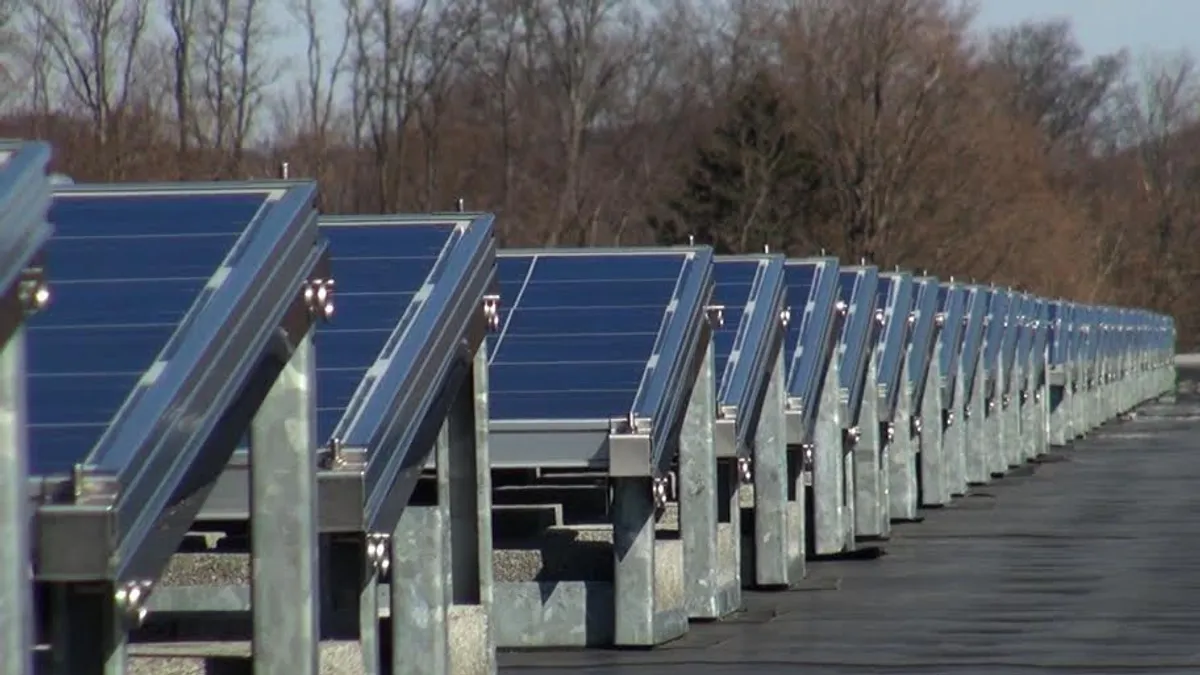Dive Brief:
- A group of six utilities and three solar companies filed a proposal with the New York Public Service Commission (PSC) on Tuesday that aims to transition the state away from the current net metering policy.
- The proposal would have community solar customers receive full retail net metering credits, but they would be partly paid by developers. The proposal would also have behind-the-meter solar credited at the full retail rate until 2020, with possible exceptions for specific locations. Starting in 2020, net metering credits would go down for new solar users until they are equal to their value, as determined under the REV docket.
- The partnership is called "Solar Progress Partnership." its members include Consolidated Edison, SolarCity, SunEdison, Central Hudson Gas & Electric, New York State Electric & Gas Corp., National Grid, Rochester Gas and Electric, Orange and Rockland Utilities, and SunPower Corp.
- The coalition said the new proposal is necessary to ensure there is no cost-shift burden from solar users to non-solar users, and the proposal will support further development of clean energy in line with the Reforming the Energy Vision (REV) initiative.
Dive Insight:
It seems like a case of strange bedfellows where solar companies are joining hands with major utilities, but the new coalition formed in New York appears to have found a middle ground for compensating solar owners for the excess energy they export to the grid.
New York is currently in the middle of a broad regulatory proceeding, the REV, which aims to transform utilities into distribution system platform providers (DSPPs) that will own and maintain the grid as usual, while overseeing the interconnection of distributed resources and the creation of distributed energy markets.
Last year, the New York Public Service Commission suspended the net metering cap until the REV valuation for DERs is complete. Meanwhile, owners of distributed generation projects will continue to receive retail rate remuneration for electricity sent to New York’s grid while the PSC and utilities look to reform rate design to ease the coming transition away from retail rate net metering. A white paper issued last year by state regulators envisions a new valuation model for distributed resources — dubbed the "value of D" — to settle debates about remuneration rates and help DSPPs site and operate DERs.
Under the proposal submitted by the solar companies and utilities, the Partnership proposes to keep the full net metering retail rate for all customers who install distributed energy resources prior to any transition away from the current rate. Community DER providers and subscribers would also continue to recieve retail rate net metering credits, but the developers would submit a payment to utilities and be assigned to a "tranche" that establishes a compensation rate and payment process based on production.
Each utility would assign a specific compensation level to community distributed generation projects, and would rank the circuits on their distribution systems where each project could provide the greatest potential benefit. Eventually, the payments from developers would be based on a formula that includes wholesale power rates, transmission costs and societal benefits.
"We're working together to keep our state's solar market vibrant while enabling us to maintain the robust power grid that solar energy requires, and in a way that is fair to all customers. Utilities and solar companies have found common ground to enhance our environment, the economy and electric reliability," said John McAvoy, chairman and CEO of Con Edison, in a statement.
Lyndon Rive, CEO of SolarCity, complimented his utility partners, expressing confidence in their ability to find a middle ground satisfactory to both sides. "The deep institutional knowledge of these six utilities, and the creative approach they are taking to the evolution of electricity, is inspiring. Leaders like these will lay the foundation for the grid of the future," Rive said in a statement.
Some critics expressed worries that the new plan would exclude smaller players, Politico New York reports. Karl Rabago, who heads the Pace Energy and Climate Center, told the news outlet that "in the early days of the Texas market deregulation, that's really what shook out the smaller developers ... I don't have a line of credit if I'm a small player."














